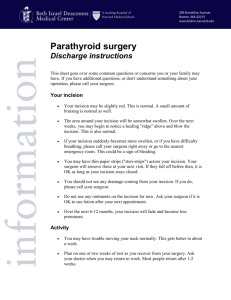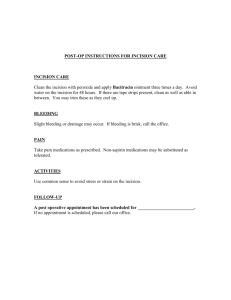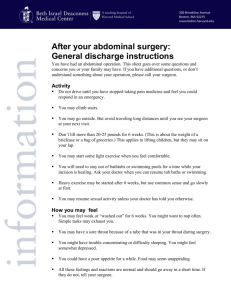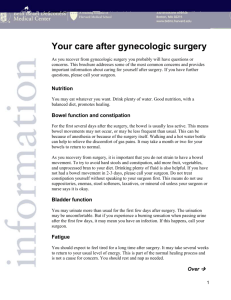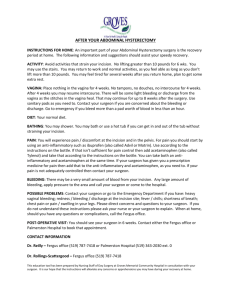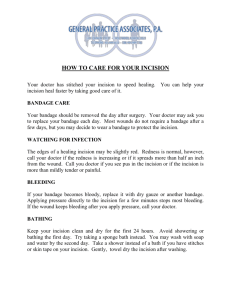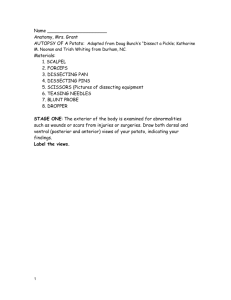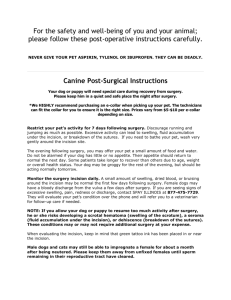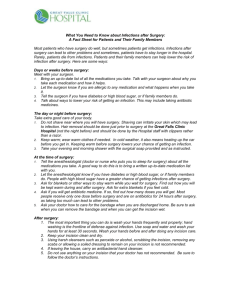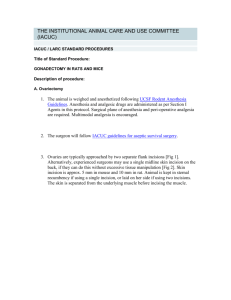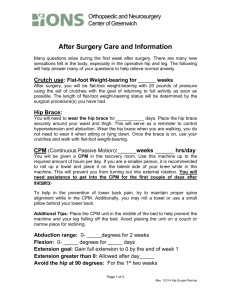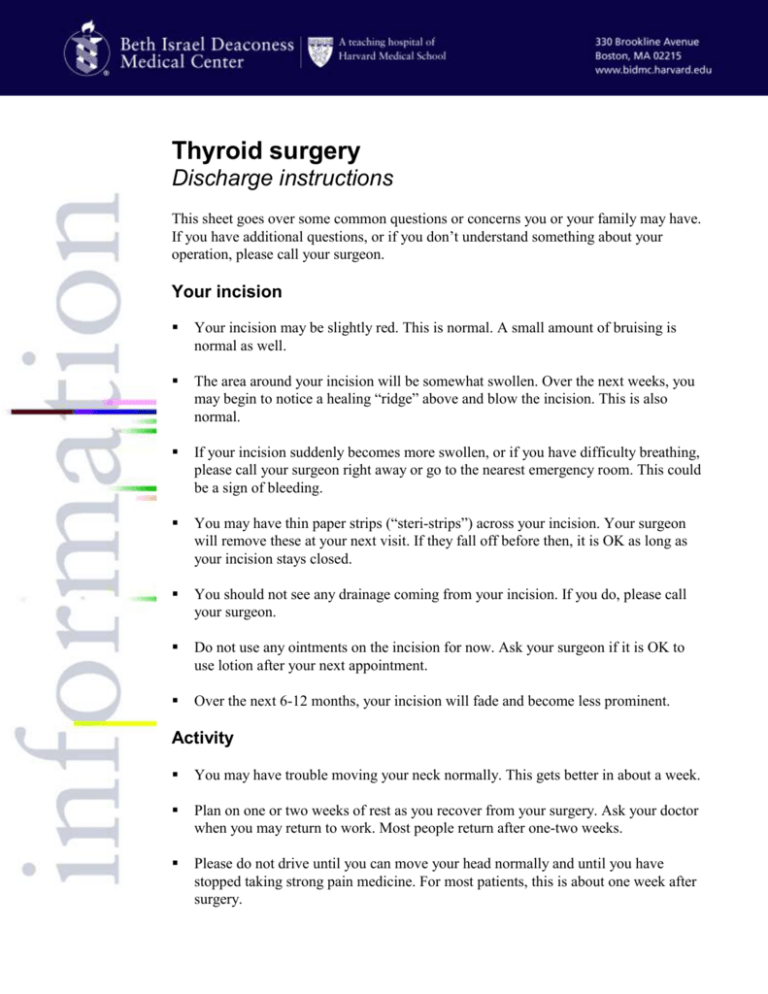
Thyroid surgery
Discharge instructions
This sheet goes over some common questions or concerns you or your family may have.
If you have additional questions, or if you don’t understand something about your
operation, please call your surgeon.
Your incision
Your incision may be slightly red. This is normal. A small amount of bruising is
normal as well.
The area around your incision will be somewhat swollen. Over the next weeks, you
may begin to notice a healing “ridge” above and blow the incision. This is also
normal.
If your incision suddenly becomes more swollen, or if you have difficulty breathing,
please call your surgeon right away or go to the nearest emergency room. This could
be a sign of bleeding.
You may have thin paper strips (“steri-strips”) across your incision. Your surgeon
will remove these at your next visit. If they fall off before then, it is OK as long as
your incision stays closed.
You should not see any drainage coming from your incision. If you do, please call
your surgeon.
Do not use any ointments on the incision for now. Ask your surgeon if it is OK to
use lotion after your next appointment.
Over the next 6-12 months, your incision will fade and become less prominent.
Activity
You may have trouble moving your neck normally. This gets better in about a week.
Plan on one or two weeks of rest as you recover from your surgery. Ask your doctor
when you may return to work. Most people return after one-two weeks.
Please do not drive until you can move your head normally and until you have
stopped taking strong pain medicine. For most patients, this is about one week after
surgery.
Some people have muscle spasms in the upper back or neck. It is important to try to
keep these muscles relaxed and to keep a normal posture. This may help reduce
spasms.
After two weeks, you may resume light exercise, such as golf or swimming. You
may return to all your usual activities three-four weeks after surgery.
You may get your incision wet the day after surgery. It is OK to shower, but do not
scrub your incision. Pat your incision dry when you are done. Sitting in a Jacuzzi or
soaking your incision is not recommended for two-three weeks after the surgery.
Pain control
The area around your incision may feel sore. This is normal and should go away in a
short time.
You will be given prescriptions for pain medicine when you leave the hospital. You
should find that you will need less pain medication as time goes on.
How you may feel
You may feel weak or “washed out” for two-three weeks. You might want to nap
often in the first few days.
You may have a sore throat or slight difficulty swallowing. Try eating soft foods
until the trouble with swallowing improves. This will get better within two weeks of
your surgery.
You could have a poor appetite for a while. Food may seem unappealing.
All these feelings and reactions are normal and should go away in a short time. If
they do not, tell your surgeon.
Signs of low calcium
Thyroid surgery sometimes affects blood calcium levels. Your surgeon may ask you
to take some extra calcium for the first few weeks after your surgery.
Your doctor may prescribe calcium or Vitamin D supplements to help prevent low
blood calcium. Make sure you understand how to take these medicines.
Signs of low calcium include numbness and tingling in the fingers or around the
mouth. These symptoms may mean you need some extra calcium. If these occur,
please tell your doctor.
Your bowels
Constipation is a common side effect of medicine such as Percocet or codeine. If
needed, you may take a stool softener (such as Colace, one capsule) or gentle
laxative (such as Milk of Magnesia, 1 tablespoon) twice a day. You can get both of
these medicines without a prescription.
Increasing your fluid intake may also help.
Medications
Take all the medicines you were on before the operation just as you did before,
unless you have been told differently.
You may be asked to take some new medicines, such as thyroid hormone or
calcium. Make sure you understand how to take all the medicines that have been
prescribed. If you have any questions, please ask your nurse or doctor.
Call your doctor if…
Please call your surgeon if you develop
any of the following. In any emergency,
please call 911 for help.
My doctor:
Name: _________________________
Sudden or gradual increase in
swelling around the neck
Difficulty breathing
Numbness or tingling in the hands or around the mouth that is not relieved with
extra calcium
Temperature of 101 degrees or higher
Redness around the incision that is spreading
The edges of the wound start to separate
Any drainage coming from the wound
Phone number: __________________
Follow-up care
Please return to see your surgeon in about two weeks. Please call your surgeon’s
office to schedule your follow-up appointment at the number listed above.
This material was prepared by clinicians from the Thyroid Center at Beth Israel Deaconess Medical Center. It is produced and
distributed by The Beth Israel Deaconess Learning Center. ©2007, Beth Israel Deaconess Medical Center. All rights reserved.
MC0831 1/07

